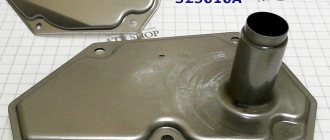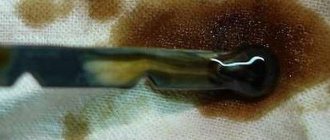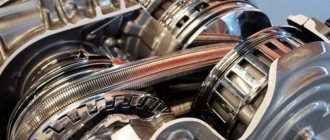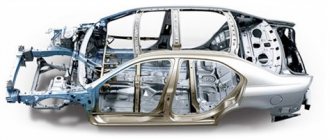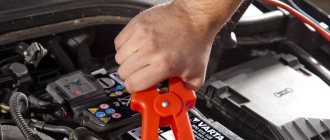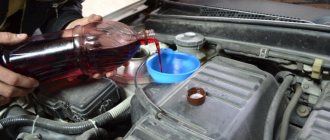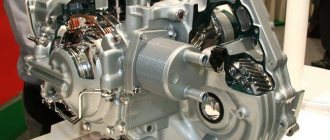The release of the Renault Arcana with a variator, like on the Koleos, namely the Jatco JF016E, but already the eighth modification, according to experts, makes the car more efficient. The modernization affected the torque converter, which made it possible to expand the power capabilities of the transmission by almost 20 percent. And the control program has received unique capabilities that were not previously offered to the Russian market.
Transmission Features
The variator itself is by no means a unique unit. The inventor of the variator is Leonardo da Vinci, and the continuously variable transmission was patented at the end of the century before last.
However, the use of stepless control of gear rotation began only after it was possible to solve the problems of high cost, large dimensions and poor performance characteristics of such units.
As for the low operating parameters, the culprit was the belt drive, which was not able to withstand the loads and failed. With the solution to the problem of high-quality belts, the variator became in demand in the auto industry.
And the leading concerns became competitors, both in the development and in equipping their own and partner car models with variable transmissions, designated by the abbreviation CVT.
As for the Arkan, this version of Renault will be equipped with the X-TRONIC variator, the latest modification of the CVT8 transmission, developed by Nissan designers.
Maintenance JF016E
This CVT has an expensive valve body along with solenoids. In untreated cases, one flush of the block along with the valves is sufficient, but in more severe situations it is necessary to change the entire block. To prevent this, it is important to promptly change the transmission fluid along with the filter. This modification of the gearbox is extremely sensitive to the purity and quality of the lubricant. It is necessary to change the ATF together with the filter at least every 40 thousand km. For a partial oil change in the variator, 5 liters of new fresh fluid is enough, and for a full change you need twice as much.
Consumables needed:
- fine and coarse filters;
- variator pan gasket;
- filter gasket.
You should select consumables carefully, since the CVT-8 has received many different modifications, so filters and gaskets are selected for each unit, taking into account the model and year of manufacture of the car.
Is the CVT8 transmission reliable?
This improved unit of continuously variable transmission of rotation, and therefore power, is designed for engines of medium power ranges and with volumes up to 3.5 liters.
And Arkan engines are mainly 150-horsepower engines with a 1.3-liter cylinder capacity, which indicates a significant reserve of power characteristics of such units. Which, naturally, means that they will be reliable on Renault Arcana.
In addition, the new transmission is economical, since fuel consumption when using it is reduced (experts say by 10 percent), and power losses due to friction are reduced by almost 40 percent.
You should also point out such advantages of variators as:
- smooth speed increase. There are no power breaks, which means there are no jerks or surges;
- Acceleration time is saved because manipulations with gear switching are not required;
- a car with a CVT does not stall in traffic jams and is not able to roll back, for example, at traffic lights installed on slopes;
- CVTs are almost silent units;
- they, as already mentioned, save fuel, which means that they are more environmentally friendly than their counterparts, both automatic and manual transmissions;
- the operation of CVTs is controlled and monitored by special systems that have the ability to adapt to the individual driving characteristics of certain drivers.
Modifications of the JF016e variator on the Mitsubishi Outlander
Lately there have been a lot of questions about the interchangeability of different modifications of the JF016e variator ( CVT-8
) on Mitsubishi Outlander. And also according to the correspondence of catalog numbers. There is a lot of confusion and misunderstanding. For this reason, we decided to write a separate post (article).
1. By tradition, the Mitsubishi company uses all CVTs on its cars (including this CVT model Jatco JF016e
) calls its articles, in this case -
W1CJC
/
F1CJC
(all-wheel drive / front-wheel drive).
The commercial (product) name of the variator from Mitsubishi is INVECS-III
CVT.
Interestingly, Nissan calls the same variator RE0F10D and RE0F10F. However, in order not to get confused in these very different names, it is customary to call this variator model Jatco JF016e.
Here is a diagram (pictures) to make the difference clear (that is, you already understand that the
W1CJC
/
F1CJC
are not interchangeable with each other:
2. On the Mitsubishi Outlander, the variator of the Jatco JF016e model is installed not after restyling in 2012 or 2015 (as some mistakenly think), but solely depending on the country of manufacture of the car (after all, in the vastness of the former USSR there are different Outlanders, both assembled in Kaluga (RF), and and assemblies in Japan:
Japanese Mitsubishi Outlander
(!) Jatco JF016e variator assembly was installed from
05.2014.
On Mitsubishi Outlander
of Russian
(!) assembly, the Jatco JF016e variator was installed from
04.2015.
How many Mitsubishi Outlander cars with the Jatco JF016e CVT were sold (specifically in the Russian Federation)? Here are the sales statistics:
a) in 2015 - 14,673 cars. b) in 2016 - 11,209 cars c) in 2022 - 16,828 cars d) in 2022 - 24,511 cars e) in 2022 (from January to June) - 10,526 cars.
Total (to date) sold in the Russian Federation 77 747
Mitsubishi Outlander with CVT model Jatco JF016e. This is quite a large number.
As for the production date, I think it’s clear now. In addition, the variator of the Jatco JF016e model was installed on other Mitsubishi cars. Here is a sign below that describes this in detail(!):
By the way, with the new product, namely the Mitsubishi Eclipse Cross, everything is much more modest (in terms of sales in the Russian Federation). A total of 2,962 vehicles were sold in 2022 and 1,030 vehicles were sold in 2022 (January June). In total, in Russia today there are only 3,992 Mitsubishi Eclipse Cross with the JF016e CVT (by the way, global sales are 71,797 Mitsubishi Eclipse Cross for last year and 48,090 for this year). That is, the Russian Federation accounts for about 4% of all Mitsubishi Eclipse Cross sales.
If you have any doubts (which model of CVT you have installed on your Mitsubishi Outlander), you can look at the plate that is present on the car. This plate is located either under the hood on the body (cars assembled for the Japanese domestic market) or on the pillar near the right front door. Below are photos of several plates (they differ depending on the country of sale and production of the car), which clearly show which model of the variator is installed:
Now let's move on to modifications. Everything is simple here too. Formally, for the Russian market there are three(!) modifications of the Jatco JF016e variator for Outlander:
1. F1CJC-1-A1Z
(4B11 engine), in GF2W body, catalog number
2700A401
2.
W1CJC-1-A1ZA
(4B11 engine), in GF2W body, catalog number
2700A403
3.
W1CJC-2-A1XA
(4B12 engine), in GF3W body, catalog number
2700A405
There are differences between these modifications. That is, you will not place W1CJC-1-A1ZA instead of W1CJC-2-A1XA (as well as vice versa) (not only will it not fit physically, since there is another “bell” (aka “docking”), but even if you and change it, it simply won’t work for you, since there is a different valve body and a different torque converter.
But since in the Russian Federation (and in other countries of the former USSR) there are “Mitsubishi Outlanders” of different countries of production and for different countries of sale (which is also important), then in reality there are not only these three modifications (which were mentioned above), but in fact all six. Here they are below on the sign. Including in this table are modifications of the Jatco JF016e variator for Mitsubishi ASX and Mitsubishi Eclipse Cross. And most of them (note) are not interchangeable with each other.
Now let’s talk about how to determine which variator (which modification) if the variator has already been removed and is lying on the floor. First of all, it has a paper sticker on it. And on this sticker there is... a catalog number.
Secondly, there is other information on the variator body itself; you can also look at the serial number and date(!) of production of this particular variator. Look at these photos/diagrams -
That is, from the last photo you already understand that this variator was released in July 2016 and has serial number 28892 (part number of the variator AA90D, according to the Mitsubishi catalog number it is 2700A402)
And this is already February 2022 and the serial number is 6174 (since this is another CVT model with part number AA90A, according to the Mitsubishi catalog number it is 2700A401).
Got it? Great. Well, now comes the interesting part. The truth is that if you have problems with your Jatco JF016e model variator on the Outlander, it is useless(!) to buy a contract (used) variator. He won't go. )))) Why? Because in the Jatco JF016e variator (or rather in the valve body of this variator) there is no module of calibration values, this is the so-called “chocolate”, which is found on all previous models of variators - JF010e, JF011e, JF015e))) Here is such a “surprise” from Mitsubishi . Accordingly, after installing this variator on the car, the control unit will have no place to get these calibration values from. This means that you (if you buy yourself a contract variator Jatco JF016e and even if it turns out to be the same modification as yours and in “very good condition” inside in terms of hardware) additionally automatically “get” a new(!) valve body . Today, the cost of a new valve body (with warranty) for Jatco JF016e is 38,000 - 50,000 rubles (depending on the modification and the seller). And this is in addition(!) to the cost of the contract variator itself. And the cost of the contract variator JF016e is not small. On average it is 120,000 rubles (prinscreens below).
Add here the cost of the hydraulic unit. This will already be 160,000 - 170,000 rubles. Plus remove and install this variator (it’s not free), plus new oil and two filters (that’s another plus 15,000 - 20,000 rubles), do you feel how the amount is approaching 190,000 rubles? ))))) But if done correctly, then you also need to additionally repair this contract (or your own) variator. Fortunately, it’s only 6,000 - 9,000 rubles extra. Since this is the weakest point of the JF016e variator and most likely both your donut and the “contract” one are either faulty or already “on the verge”... etc. This is the situation today.
What then is the right thing to do if you start having problems with this variator on your Outlander? The same thing that other literate people do. After all, a very large number of Nissan and Mitsubishi cars with the Jatco JF016e variator are out of warranty, have problems with the transmission and come to us for diagnostics and repair of the variator. To date, we have already repaired several dozen (!) CVTs of the Jatco JF016e model and we already have collected statistics on their problems, repairs and modernization (few people still know how to do this for the Jatco JF016e). And (if we talk about price) high-quality repair of a Jatco JF016e with a guarantee (!) on Outlander is financially cheaper (!) than a week's purchase of a contract variator with a new valve body. And if so, then what kind of conversation can there be about a contract CVT? Don't waste your time.
How then can we try to prevent the variator from being repaired (drive for a long time on a working one)? Unfortunately, we have to admit that the Jatco JF016e CVT is not the most reliable CVT in the entire line. The valve body of this variator is very critical to the purity of the transmission fluid (as I already wrote in other articles, new modern solenoids with small clearances are installed there). However, our experience shows that regular (at least once every 40,000 km) partial oil change in the variator (and always with removing the pan, replacing filters and cleaning the magnets) significantly extends the residual life of the variator. We have statistics on observing Outlanders with this model of CVTs and mileage of more than 200,000 - 250,000 km (they simply regularly change the oil in the CVT as described above). This means that not everything is so bad and you can try to extend the life of your variator. And changing the oil yourself in this variator is not so difficult. It is not necessary to go to the OD for this. There are also non-original consumables for changing the oil (which will allow you to save on this procedure). We have a separate article about this on our blog, please look - Jatco JF016e - oil change in Mitsubishi CVTs (CVT-8, models F1CJC / W1CJC) - non-original consumables
Well, if you still feel some problems with your variator (that it somehow drives wrong, picks up speed, etc.), and even more so if there are any jolts and jerks, then the sooner you come for diagnostics , the faster and cheaper it will be to solve the problem with your CVT. Our branches are in Moscow and St. Petersburg. Call and come. Don't prolong problems with the variator.
Our phone number in Moscow Our phone number in St. Petersburg
Problems and disadvantages
Like any units that, in addition to their advantages, also have their “cons,” CVTs:
- cannot produce maximums of both power and rotation for a long time;
- require careful maintenance in the form of timely replacement of both oil and filter elements. As a rule, these manipulations should be done every 30 thousand mileage;
- use special purpose fluid for belts. Firstly, it is not cheap and, secondly, it also requires regular replacement;
- vulnerable to rough operating conditions. Sharp acceleration and emergency braking are not for them. Therefore, lovers of aggressive behavior on the roads should think carefully before deciding to choose a Renault Arcana with a CVT;
- when repairing, firstly, they require special auto repair shops, which are not yet sufficient in Russia, and, secondly, repair procedures are much more expensive than restoring both automatic transmissions and manual transmissions;
- Control systems may also experience certain problems. Which in turn can lead not only to incorrect operation of transmissions, but also to breakdowns of expensive units.
Common CVT-8 Problems
Motorists have probably heard about the problematic oil pump JF015E. So, the pump remained the same, and the problem with the pressure relief valve getting stuck due to prolonged operation in dirty oil was even more acute at first. The box does not tolerate long-term operation at maximum pressure: the belt begins to slip, which leads to serious damage to the cones.
Common faults include:
- Regulator solenoids. Expensive (linear, Aisin type) devices received a built-in anodized manifold valve. The valves have been unified, they are the same, which in theory makes them easier to repair/replace. Overall, they are quite reliable and durable. Most problems with linear solenoids are caused by deviations from the box maintenance regulations.
- Valve unit failure. At first, the valve body in this variator did not last even 100 thousand km. The main reason is aggressive software settings. So the client was lured by the dynamics of acceleration. Later, the settings were “twisted”, allowing the valve body to operate in optimal load conditions. The problem is no longer so relevant today.
- GDT locking clutch. The Japanese borrowed from their German colleagues the technology of expanding the blocking zone. On the one hand, dynamics have increased, and fuel consumption has decreased. But at the same time, the locking clutch began to wear out quickly and contaminate the oil. Wear products can damage the torque converter.
Another fairly common reason why drivers go to workshops for repairs is wear of the cone bearings. In addition, bearings can break their seats, which only aggravates the process of restoring the unit.
CVT or manual transmission - that is the question?!
Judging by the reviews of Koleos owners, they were initially very wary and distrustful of continuously variable transmissions.
However, over time, some drivers were forced to change their driving behavior from aggressive to more restrained driving when their CVTs broke down. And others, due to age or a change in marital status (the appearance of children in the family), also moderated their fast appetites.
And now, both the first and the second, almost in a single impulse, scatter compliments to the CVTs, like famous birds about their swamp.
As already noted, when choosing whether to buy an Arcana with a CVT, or, nevertheless, give preference to a traditional manual transmission, everyone needs to think about it. Or, as they say, ask yourself the question: is this game, in the sense of a variator, worth the candle?
You can, of course, take into account that the Arcana with a CVT will accelerate faster, drive quieter, and consume less fuel. On the other hand, you need to get used to the variator, it has expensive maintenance and, if, God forbid, a breakdown occurs, then repairs will also be required.
In general, every city has its own character and rights, and every car enthusiast has his own mind.
Read further:
Renault Arcana gearbox: manual, variator, automatic or robot?
Advantages and disadvantages of Renault Arcana all-wheel drive
All the pros and cons of Renault Arcana in owner reviews
Renault Arcana - acceleration to 100 km/h
Tuning Renault Duster
You'll be third
The tenth family was replaced by the CVT8 series. These are third generation CVTs. On our market it is represented by models JF016E and JF017E. Despite a complete generation change, the new CVTs are built on the basis of their ancestors.
The JF016E variator replaced the “old man” JF011E and inherited its engine range. Among its carriers, for example, are the new generation Nissan Qashqai and X‑Trail. The JF017E and JF010E series swapped places in the same way - the new CVT was installed under the hood of the fresh Nissan Pathfinder and Murano crossovers, as well as the Infiniti QX60/JX35.
The third generation units differ from each other more than their predecessors. Strengthening the elements of the JF017E variator to handle higher torque required the use of a pin belt (the so-called chain), while the JF016E retained the usual plate belt.
The heart of the JF017E variator: cones and a pin belt (the so-called chain). There are some minor nicks on the cones, so they will be sent for grinding. Pin belts for Jatco are made by LUK; they cost about 20,000 rubles.
The heart of the JF017E variator: cones and a pin belt (the so-called chain). There are some minor nicks on the cones, so they will be sent for grinding. Pin belts for Jatco are made by LUK; they cost about 20,000 rubles.
The design basis of the CVT8 family is twofold. At one pole is the hardware from the tenth series that has been simplified in order to reduce the cost of production, and at the other is the excessive complication of the control system. Both of these led to a noticeable, one and a half to two times, reduction in the service life of the units. However, CVT8 CVTs remain maintainable. The cost of their full restoration is even lower than that of representatives of the tenth family, and usually does not exceed 150,000 rubles
.
The valve body is the most demanding unit of the CVT8. The manufacturer saved as much as possible on the “iron” base and removed the stepper electric motor, which on CVTs of the tenth family controlled the oil pressure to change the gear ratio in the cones. The design of the valve body was changed, using additional solenoids of a new type. Moreover, here too the manufacturer was greedy, choosing solenoids that were cheaper to manufacture and had different output parameters. Therefore, with a new variator or valve body there is a disk with individual calibrations for each valve. If you do not register them in the unit control unit, the variator will not work correctly or the car will not move at all.
